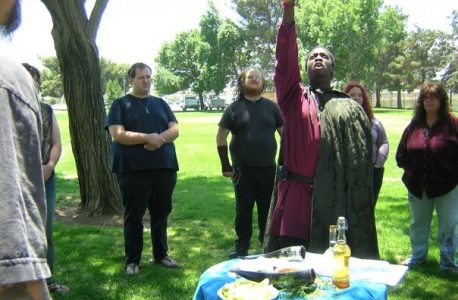By Ethan the Autiste for Identity Dixie
Many in the Alt-Right have made valid criticisms of the Church over the past few years. The Pope, the Episcopalians, many Presbyterians, etc. are all welcoming homosexuality, mass immigration and other degenerative forces against Western Civilization. In the face of this, it makes sense why people are rejecting the Church. Church membership is down and between 2002 and 2016, the percent of Americans who identify as nonreligious jumped from 10 to 18 percent, whereas in 1948 it had been only 2%.
Seeing the issues in Christianity, many in the Alt-Right are simply atheists or agnostics, having been disillusioned by mainstream religion. This isn’t a viable path for most people because there is a natural inclination towards religion and Pew Research indicates religious people tend to be happier than secular people.
Because of the problems in Christianity and the benefits of religion, others have chosen to pursue the pre-Christian European faiths. This path has inherent problems, too. While proponents believe them to be traditional faiths, they ignore that there are leftists leading these groups, proof positive that these things can also be subverted. One need only look at an assembly of Ásatrú worshippers to realize that it is already subverted. You wouldn’t think it at first. In fact, their website indicates an ethnic component to the worship (which is also why I find it odd when alt-righters of non-Germanic descent worship Odin). However, that’s the only correct thing on their site.
The head of Ásatrú in Iceland (a country which is 89% Icelandic and at most 5% non-European), Hilmar Hilmarsson, was “horrified” at seeing people at Charlottesville marching with pagan symbols and said that the “racist” interpretation of heathenry is “a total perversion” of the original mythology, which he called “a wonderful blueprint” for multiculturalism and diversity: “The gods are of mixed races. We even have a crossdressing god.” Some LGBT practitioners told Hilmarsson’s interviewer that the gender fluidity of the Norse gods is part of what makes Ásatrú attractive to them and that the faith has always been “deeply inclusive.”
Likewise, Karl Seigfried, a pagan priest and adjunct professor at Illinois Institute of Technology is working on creating a uniform doctrine of Ásatrú worship to address things like, “What do heathens think about reproductive rights? The role of government? Climate change? Gender identity? … We will never be included in the greater public discussion if we don’t first step forward and put our ideas on the table.” Diana Paxson, another Ásatrú worshipper, said “To fight beside the gods of Ragnarök today means to get really involved in environmental protection and all the political structures that support it.” She also said, “In pagan times, there was no real concept of race,” and is working on denouncing bigotry, as are Ásatrú worshippers around the world. Sweden even has a group called Vikings Against Racism which does counter protests at Nordic Resistance Movement events. This goes so far as to having those in charge of the Facebook groups for Ásatrú groups checking out the profiles of people who seek to join, making sure they don’t have anything on their profile indicating “racist leanings.” The same woman who said she checks profiles for racist leanings also said, “I think it’ll be easier to explain to people why the blood-and-soil idea makes no sense historically or spiritually.
Also, the mythology itself has problems. As Hilmarsson pointed out, there’s a lot of gay and degenerate myths in the beliefs of the Norse. There is plenty of mixing of races in the myths, and there’s bestiality. For example, Sleipnir, the best of all horses, is born from Loki’s bestiality, which seemingly indicates the bestiality in this instance is good, not a myth about a cautionary tale. Bestiality seems to be a common occurrence in all pagan faiths.
The other issue with paganism is that even if you are trying to worship what the Europeans of 1,000 years ago worshipped, we don’t know how they worshipped. Our best account of Norse mythology is either the Codex Regius or the Prose Edda. The Codex is what the Poetic Edda comes from and is estimated to be from the late 13th century, but the oldest copy apparently was lost for a few centuries and when it was found in the 17th century, it was missing some pages. The Prose Edda was written in the 13th century by Snorri Sturlson, a Christian himself in Iceland 200 years after Iceland had converted to Christianity. It’s likely that Sturlson made up a good chunk of what is in the Prose Edda, though much of it is based on stories also found in the Poetic Edda. The fact that we aren’t sure what the Norse truly worshipped can somewhat be blamed on Christians during the period destroying records. This seems to be something neopagans acknowledge when they do their philippics against Christianity, which itself should be proof to them that the religion they’re worshipping is not the religion of the original pagans. Modern paganism is probably as different from ancient paganism as modern Talmudic Judaism is as different from the Judaism of Moses.
There is no unsubvertible system. Saying “I don’t believe God is real because of the Church today” makes little sense. It’s in the same vein as “Oh, because of a single shooting, we need to get rid of guns” or “Oh, this shooting was done by whites, therefore most crime is because of white people and white supremacy.” No. We need to look at the whole. What the data says is that guns don’t correlate with crime, 13 do 50, and Christianity built Europe.
So, with paganism equally subverted or subvertable as the modern denominations of Christianity, it doesn’t make sense to abandon the True God, but rather to reform Christianity. This has been tried before to varying degrees of success. Some, like the Christian Identity movement or the German Positive Christianity, have attempted to reform Christianity, but ignore what Jesus said and did.
I’m not advocating a reform like Christian Identity or Positive Christianity, but rather focus on founding smaller groups of true worshippers of Christ and establishing kin networks that focus on community and tradition. Find a good church, become a leader in it, and guide it away from evil. I was in Church the other day and the minister pointed out an interesting set of stats. If a child comes to Christ, there’s a 3% chance the rest of the family will. If the mother does, 17% chance the family will follow. If the father comes to Christ, there’s a 93% chance the family will.
The man leads the family spiritually. Don’t lead your family down the wrong path simply out of dissatisfaction with the modern world, but find your own way to fight against it and give your family a future.

